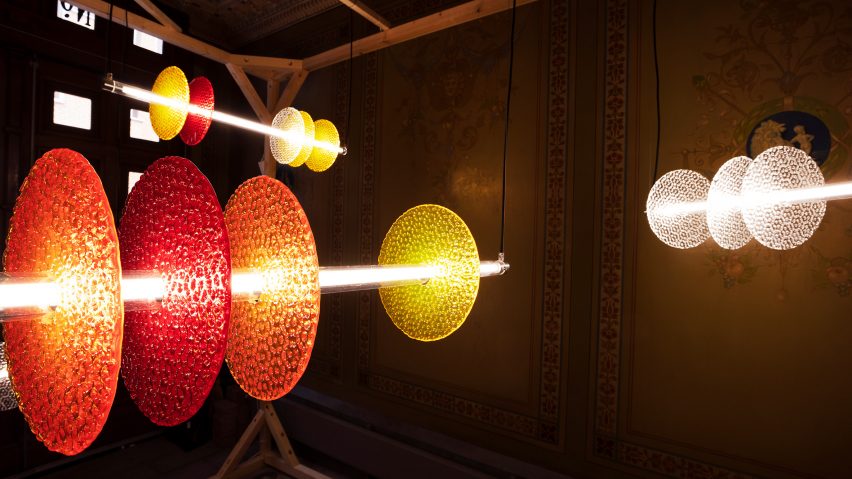A residence that has belonged to the family of designer Emma Marga Blanche, co-founder of Färg & Blanche, for four generations provides a striking backdrop for the studio's Stockholm Design Week exhibition.
Built in 1889, the building was originally the home of Blanche's great, great grandfather Julius Westerdahl but also contained a traditional Swedish crispbread bakery, the family business.
For Stockholm Design Week, it provides a backdrop to 12 contemporary objects created by Färg & Blanche, all designed to relate to the home's ornate interior.
"We think the most important thing that we decided when we set up to do this exhibition is that we didn't want to take away from the setting – we were adding something," the duo explained in an interview with Dezeen.
"The brief was not to make something that fits exactly with the space, it was to create a dialogue and take inspiration from it."
Originally the townhouse-style building had a bakery at its bottom and living spaces up top, but today it is mostly used by the Blanche family to host events for their arts and culture foundation Julius Hus.
Westerdahl erected the house after coming into some fortune making a new style of crispbread – a traditional Swedish cracker that is round in shape and has a dimpled texture.
In tribute, one of the pieces that pair has made for the installation is a lighting design made from coloured glass discs that look exactly like the crackers. These are installed in the home's entryway, hanging from the ceiling on strip lights to mimic the way crispbreads are hung up to dry after baking.
The discs were hand made in one of Sweden's oldest glassworks, Målerås.
Upstairs in the main living room, timber tables with star-shaped bases are meant to look as if they naturally "grow upwards" from the home's patterned parquet floors. They also complement the room's dark wood-panelled walls.
An arched stairway is dotted with bulbous floor lamps that appear to be bound in strips of brass, drawing on the aesthetic of Färg & Blanche's Succession collection of homeware from 2016.
Meanwhile a small, jade-green room at the back, centred by a grand piano, is softly illuminated by candles that appear to melt off the mantlepiece of the fireplace.
In the adjacent sitting room, which has plush decor details like a burnt-red velvet sofa and fringed curtains, visitors can take a seat on a keyhole-shaped fabric stool.
"When I was a little girl I loved to look through the keyhole, you would see a whole world of things through there," said Blanche.
Other pieces in the room, like the duo's By My Side table, are surrounded by stone busts and vintage photographs of past family members.
Finally, in the sage-hued study next door, the Mr N chair by Färg & Blanche sits at a writing desk. It takes its name from Blanche's grandfather, Neil.
"We like to see our furniture as alive, as people, we build up stories around them," said the duo.
"It was really fun finding old pictures, film from the [glass] factory from the 1920s – when you see one of our pieces, no one may know the full history, but it's personal for us."
The Baker's House installation is open to the public until 9 February 2019 at Bondegatan 21A. It will host a talk later today chaired by Dezeen editor-in-chief Marcus Fairs, with designer Alexander Lervik, Emma Marga Blanche and Marco Checchi of Studio Stockholm.
The event is invite-only, but we will be livestreaming the talk at 5:30pm UK time.

